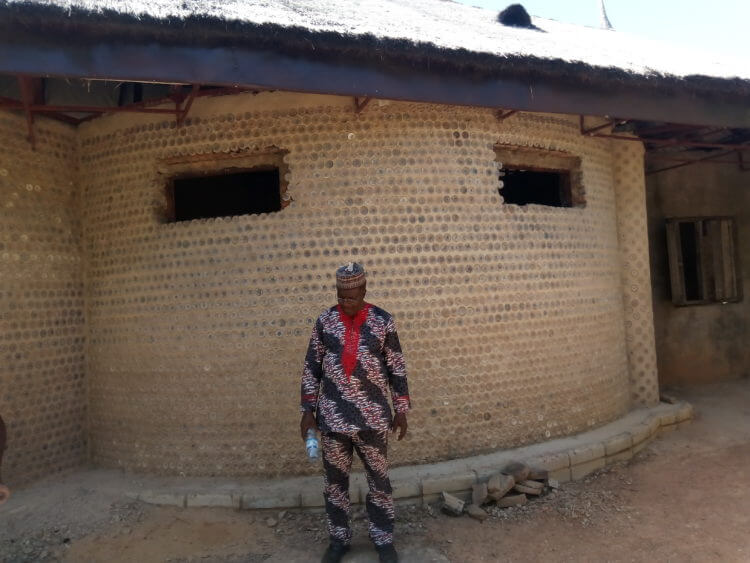Improper waste management is a global challenge, threatening climate sustainability and community safety.
Empty bottles, nylons, packs of consumables and other waste materials discarded by humans are littered in gutters and pollute most Nigerian cities. Some end up in landfills, where they dissolve and release harmful chemicals into the soil, while others end up in rivers and oceans, where they entangle with marine life and kill them.
Sometimes, plastic materials are burned, releasing poisonous chemicals into the air, thereby endangering public health.
A 2020 United Nations Industrial Development Organisation report says Nigeria “is among the top 20 countries that contribute 83% of the total volume of land-based plastic waste that ends up in the oceans”.
Plastic bottles as bricks
One man in Nigeria’s northwest state of Kaduna and his community nonprofit organisation were thinking about reducing the number of plastic bottles in the environment.
So they designed and built houses using plastic bottles as bricks. Developmental Association of Renewable Energies in Nigeria or DARE, led by Yahaya Ahmed, built the house using 14,800 sand-filled plastic bottles.
The group spent several months collecting discarded bottles from hotels, restaurants, homes and dumpsters.
Located at Unguwar-Yalwa on Kaduna Zaria Road, the house has three rooms, a toilet and a kitchen.
It takes between N10.5 million and N20 million ($24,000-$45,000) to build a decent 3-bedroom bungalow in Nigeria. But making this structure from plastic waste was cheaper, the group said.
“It’s the cheapest house everyone can construct without spending much money because the building materials are available on the streets and trash dump centres,” Ahmed said.
Aside from environmental preservation, the initiative was also set up to train youths to learn how to construct such structures to earn income.
The process involved filling the bottles with sand, stacking them side-by-side, and binding them together with mud to create a wall.
Ahmed claims the building is “20 times stronger than brick wall houses and can last for over 300 years if constructed properly and carefully. It is fireproof, bulletproof, and earthquake-resistant and can adapt to climate changes, desertification and deforestation.”
The correctness of Ahmed’s claim about the strength of the building is yet to be confirmed, especially since he has no proven scientific evidence. Nonetheless, the initiative reminds society to think about the many ways plastic waste could be subjected to reuse for environmental sustainability and the protection of human and animal lives.
Improper waste management poses a significant threat to climate sustainability and public health globally, particularly in Nigeria where plastic waste is rampant. Discarded bottles, nylons, and other waste pollute cities, end up in landfills or oceans, and release harmful chemicals when burned. This issue has placed Nigeria among the top 20 contributors to oceanic plastic waste.
In response, Yahaya Ahmed and the Developmental Association of Renewable Energies in Nigeria (DARE) have innovatively used discarded plastic bottles to construct houses. Collecting 14,800 bottles, they built a house in Kaduna with three rooms, a toilet, and a kitchen. This method is cost-effective compared to conventional construction, accessible, and promotes youth training and employment.
Plastic bottles filled with sand are used as bricks, bound with mud, creating structures claimed to be highly durable—fireproof, bulletproof, and earthquake-resistant. Though these claims lack scientific validation, the initiative highlights the potential for repurposing plastic waste to support environmental sustainability and community resilience.






